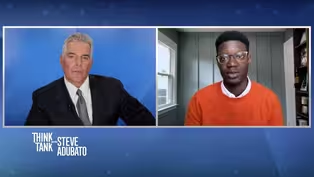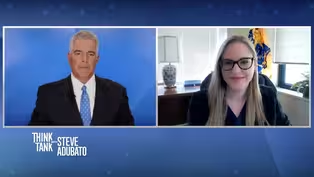
Hackensack Meridian Health CEO Launches Intervention Program
Clip: 6/17/2023 | 8m 39sVideo has Closed Captions
Hackensack Meridian Health CEO Launches Intervention Program
Robert C. Garrett, CEO of Hackensack Meridian Health, joins Steve Adubato to discuss Project HEAL, a hospital-based violence intervention program.
Problems playing video? | Closed Captioning Feedback
Problems playing video? | Closed Captioning Feedback
Think Tank with Steve Adubato is a local public television program presented by NJ PBS

Hackensack Meridian Health CEO Launches Intervention Program
Clip: 6/17/2023 | 8m 39sVideo has Closed Captions
Robert C. Garrett, CEO of Hackensack Meridian Health, joins Steve Adubato to discuss Project HEAL, a hospital-based violence intervention program.
Problems playing video? | Closed Captioning Feedback
How to Watch Think Tank with Steve Adubato
Think Tank with Steve Adubato is available to stream on pbs.org and the free PBS App, available on iPhone, Apple TV, Android TV, Android smartphones, Amazon Fire TV, Amazon Fire Tablet, Roku, Samsung Smart TV, and Vizio.
Providing Support for PBS.org
Learn Moreabout PBS online sponsorship- I wanna welcome Bob Garrett, CEO of Hackensack Meridian Health.
Good to see you, Bob.
- Good to see you too, Steve.
Put it in context, please.
- Yeah, so unfortunately we're seeing significant increases in violence at our hospitals and in schools, in society in general.
The stats are really overwhelming, Steve.
It's really, and I just, I just shake my head when I think about this but gun violence now is the biggest killer of children in the US, which is really staggering.
48,000 people in the US died by gunfire last year.
So we've declared it, along with 50 other health systems across the country, as a public health emergency.
And what we're trying to do is certainly prevent it wherever possible.
- Oh, I'm sorry, Bob, why do you think there's such an uptick?
- Well, I think, I think part of it has to do with the pandemic and the mental health issues that have related, have been a result of that pandemic.
- Right.
- I think that's certainly a major factor, Steve.
But we actually saw the number of violent incidents going up even before the pandemic, so it was going in that direction.
But I think the pandemic certainly exacerbated those trends.
So what we're focused on is prevention and then we're also focused on being able to help victims and their families of gun violence.
So on the prevention side, again, we have signed a pledge along with 50 other health systems across the country.
We're part of a consortium that is being led out of Northwell Health in New York.
And what we're trying to do is find strategies to help prevent gun violence and we think by declaring it a public health emergency, maybe staying out of the politics related to the Second Amendment and guns, but just understanding that whatever your position is on the Second Amendment, this is a public health emergency and we have to, whether you're a gun owner or you're not a gun owner, we have to take steps to try to prevent this senseless killing, particularly of of young people like children and adolescents.
So we're working with these other health systems to find the right strategies, but we also have put in programs that help victims of gun violence as well.
- Bob, sorry for interrupting, we actually, I'm sorry for interrupting, we actually had one of your physician leaders engaged in something called Project Heal.
- Yes.
- What is that and how is it connected to the fight against prevention of violence as a public health issue?
- So Project Heal actually is a program that helps victims of gun violence or their families.
So it's a program that's funded through federal funds as well as state funds.
And we set up Project Heal at Jersey Shore University Medical Center.
We hope to expand it at some of our other sites but what it does is we help those victims by referring them to the right help.
They might need behavioral health types of assistance, they might need social assistance, they might need additional medical assistance.
Also, it's a crisis for their families so we also make referrals for their families.
And I'm happy to say the program just celebrated its two year anniversary and we've already helped over 400 families, which is really, really significant.
And we're hoping that because it's been so successful that we can demonstrate that it's a model that should be replicated not just throughout New Jersey, but throughout the country.
And we're gonna start at Hackensack Meridian by offering it at some of our other hospitals as well.
- It's so interesting.
First I'm gonna disclose a couple things.
One, that I teach in the Hackensack Meridian Health Physician Leadership Academy, and I've gotten to know many of the physicians there, many of whom are involved in dealing with those who are victims of violence.
And also that HMH is a long longtime underwriter of our programming with Bob.
One more quick follow up on this.
When the nursing shortage becomes more pressing, what impact does that have on physicians in what they do and other clinicians on the front lines?
Because it's not just nurses are here, physicians are here, respiratory therapists.
It's... - It is a team sport, you know, between physicians, nurses and other professionals and support personnel.
So if there's a severe shortage in one, it really impacts the job functions of others.
So let me talk a little bit about what we've done for nursing in particular.
Since the beginning of the pandemic, we've invested over $600 million in salaries and benefits for our team members.
And as a result of that, we've been able to hire over 2000 nurses in the past year alone.
So that's encouraging.
But many of those nurses are coming out of school and they need to be trained.
They need to be oriented.
The good news is we have three nursing schools within Hackensack Meridian Health Which serve as a pipeline for jobs throughout our health system.
And, you know, what's even I think more impressive in some ways is we have over 500 affiliations with other schools, not just for nursing, but for other healthcare professionals as well.
So there's a good pipeline.
But in spite of that, it's still you know, it's still been tough because there's been a lot of issues that that have led to nurses and other healthcare professionals leaving the field.
You talked in our previous interview about fiscal challenges, long-term fiscal challenges at HMH and other healthcare systems, hospital systems across the nation face.
A lot of it, much of it COVID related.
But you're also now talking about violence as a public health issue, which only expands upon the demands of hospitals and hospital systems.
Is there a disconnect between A, the need to cut expenses, be more fiscally conservative while you're expanding programs to deal with public health issues like violence?
- There's a tremendous disconnect there.
And our mission is to transform healthcare, it's to improve the health of our communities.
And a public health crisis like gun violence and violence in general is something that's near and dear to our mission.
So we have to, we have to continue to fund programs like that, but that's why we're asking for assistance from our partners, whether it be the state government, the federal government, to fund programs like Project Heal because these are tough times for healthcare networks and for hospitals.
But honestly, as you're pointing out, the demand for these types of services and this type of help is incredible.
There's never been more of a need for it than now.
- And that also includes behavioral health, mental health issues, violence, a whole range of issues.
Bob Garrett is the Chief Executive Officer of Hackensack Meridian Health.
Bob I wanna thank you so much for taking the time to talk with us.
- Thanks for having me, Steve.
- You got it.
I'’m Steve Adubato, we will see you next time.
- [Narrator] Think Tank with Steve Adubato has been a production of the Caucus Educational Corporation.
Funding has been provided by The Turrell Fund, supporting Reimagine Childcare.
The New Jersey Education Association.
The Healthcare Foundation of New Jersey.
The Port Authority of New York and New Jersey.
Choose New Jersey.
Horizon Blue Cross Blue Shield of New Jersey.
The Adler Aphasia Center.
New Jersey Sharing Network.
And by Robert Wood Johnson Foundation.
Promotional support provided by Meadowlands Media.
And by NJBIZ.
- At the Turrell Fund, We know childcare creates transformative early learning experiences for young children, and helps families succeed.
Childcare is essential for the economy, driving financial growth and sustainability across all sectors.
The Turrell Fund envisions a New Jersey in which every infant and toddler has access to high quality, affordable childcare In order to grow, develop and thrive.
Our children are our future.
For more information, visit TurrellFund.org.
The Educational and Cultural Significance of Hip-Hop
Video has Closed Captions
Clip: 6/17/2023 | 9m 26s | The Educational and Cultural Significance of Hip-Hop (9m 26s)
The Ongoing Need for Childcare and Food Assistance
Video has Closed Captions
Clip: 6/17/2023 | 10m 1s | The Ongoing Need for Childcare and Food Assistance (10m 1s)
Providing Support for PBS.org
Learn Moreabout PBS online sponsorship
- News and Public Affairs

Top journalists deliver compelling original analysis of the hour's headlines.

- News and Public Affairs

FRONTLINE is investigative journalism that questions, explains and changes our world.












Support for PBS provided by:
Think Tank with Steve Adubato is a local public television program presented by NJ PBS

